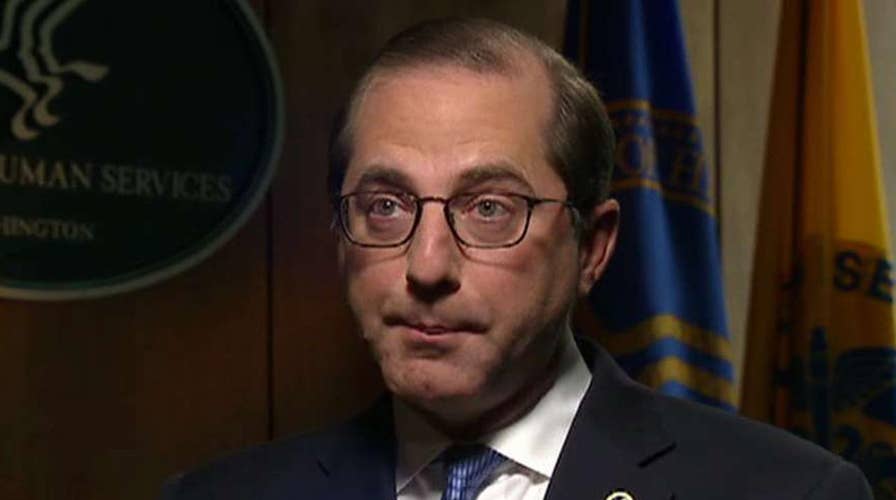HHS Secretary Alex Azar talks improving health care
Dr. Marc Siegel sat down with the new Health and Human Service Secretary Alex Azar.
Under the current system, getting information about your own health care and the care your children get can be challenging and confusing.
What’s in your medical records? How do you even get access to them? How do you understand what all the strange medical terminology means in plain English? How much do particular treatments, procedures and drugs cost? How do you make intelligent choices about dealing with your health conditions? Why can’t you be in charge of your own health care?
These questions came to my mind last Wednesday when I learned that my 13-year-old son was receiving an inadequate antibiotic for an ear infection because his medical chart wrongly listed him as having a penicillin allergy. Though both my wife and I are physicians, we didn’t have automatic access to this information.
On Thursday I traveled to Washington and heard new Health and Human Services (HHS) Secretary Alex Azar speak at the American Health Insurance Plans Conference about the exact kind of problem that had occurred with my son – and that affects millions of other Americans. Azar also provided his solution.
First, a bit about Azar’s background. He has unique qualifications for his job because he previously worked at HHS as both general counsel and deputy secretary under President George W. Bush. In the private sector he was president of the U.S. division of Eli Lilly and Company, a major drug company. He also grew up in a medical family. His father, Dr. Alex Azar, practiced ophthalmology for over three decades.
At the conference, Secretary Azar stated emphatically that he and President Trump are committed to disrupting the current structure of our health care system. He said they are going against special interests with the goal of putting the patient at the center of his or her health care.
These are prodigious claims, and afterwards Azar sat down with me in an exclusive on-camera interview for Fox News and explained what he means by changing today’s volume to tomorrow’s value.
“We are trying to work to facilitate that information be accessible to top app developers so that information can be sucked into applications that are very useable and intuitive for the patient to look at their own data,” Azar told me. “We think that is a big part of putting the patient in the driver seat in the health care system.”
Clearly, we live in a technological world where it is an advantage for patients to have all their health information no farther than their smartphone. I cautioned that as a physician, I am aware that a patient may worry excessively over results too easily taken out of context. Dr. Google doesn’t always reassure, and your physician is less and less likely to be available.
But Azar said he is prepared to use the broad reach and power of the HHS for positive change. HHS includes the Centers for Disease Control and Prevention, the National Institutes of Health, the Food and Drug Administration, the Public Health Service, Medicare and Medicaid.
“HHS has a $1.2 trillion budget.” Azar said. “That means it’s bigger than the British Empire.” He spoke to me about using this power and reach to increase transparency and decrease costs. He pointed to this week’s news of United Healthcare asking for a portion of its employees to receive prescription drug discounts. “I think that’s a direct result of pressure on drug pricing and benefits,” he said.
Azar told me his own story of being victimized by the current system as an example of where improvements in price transparency are needed. While he was deputy HHS secretary he went to see his primary care doctor, who ordered a routine stress echocardiogram. But the test was scheduled – without his prior agreement – in the hospital, which would have caused the cost to skyrocket from $550 to $5,500 before the insurance discount was applied. Azar said he removed the hospital wristband and left.
“I know what I’m doing. I know this space,” Azar said. “I know how cost works in the system. What if I were a grandmother and I’m trusting the system will take care of me? What if I’m a 20-something and I have a high deductible plan? I was able to fight for that information. I knew to fight for that information ... they wouldn’t. I think it’s a right to know up front what we are going to pay for a procedure.”
Azar said he and President Trump believe that by putting the patient in charge, using Medicare and Medicaid to reward quality throughout the health care system and having costs knowable up front, the price will come down and the value will go up.
As a practicing physician I tend to agree with this approach. I would just as soon see the insurers, drug companies and government recede into the background when it comes to health care delivery.
Sure, let the patient be in charge. Why not use the latest digital technology to channel this information right to his or her fingertips?
As a doctor I would only caution that too much information is not always a good thing. Sometimes my patients jump to too many conclusions and worry too much about worst-case scenarios. This is especially true as health care solutions become more and more complex.
Personalized health care is a good thing to have and the patient should certainly be in charge of it. But we also need a support system that provides the right answers to a patient’s growing questions.
Fox News Field Producers Jeremy Copas and Meghan Welsh contributed to this article.

